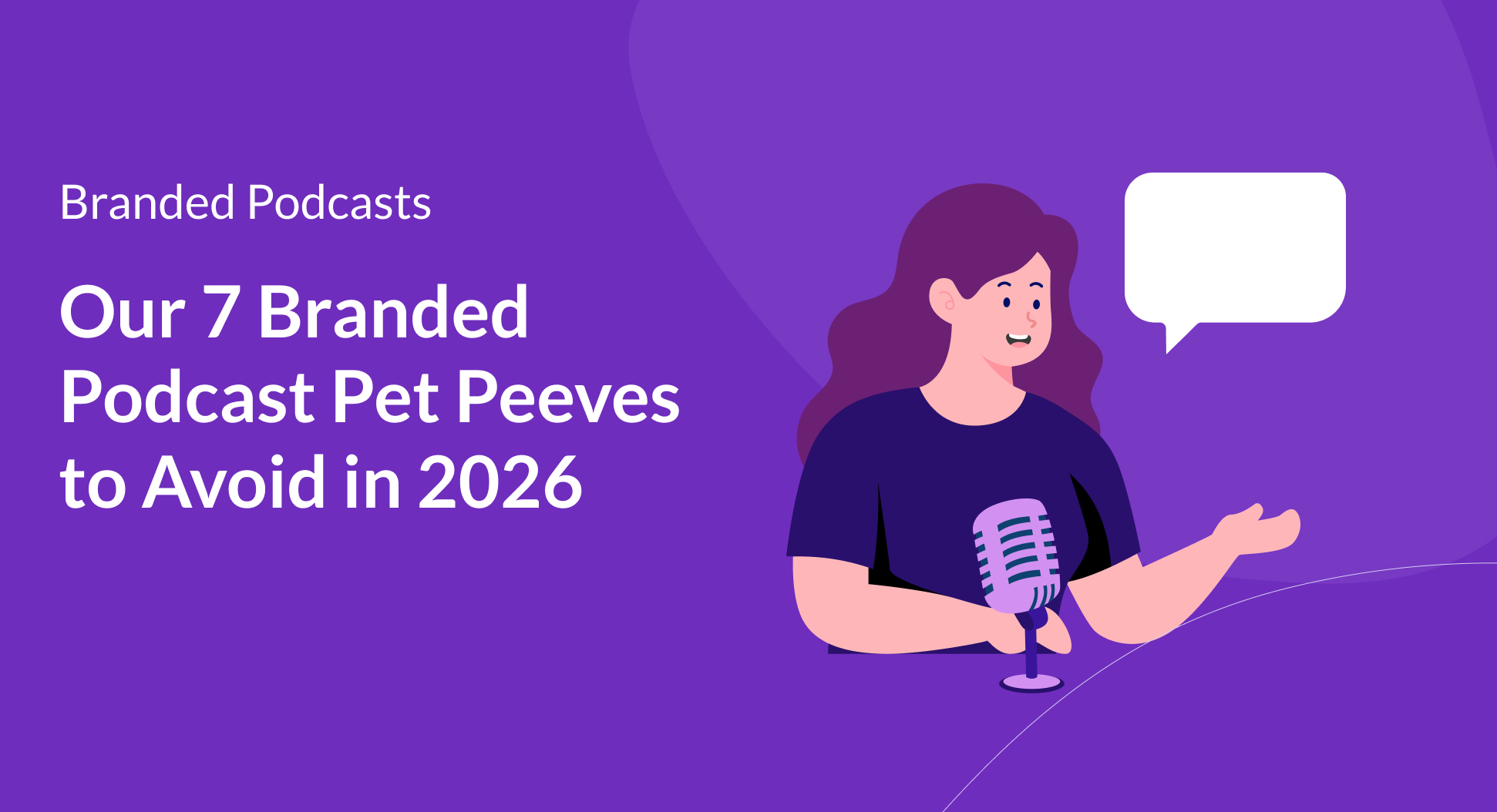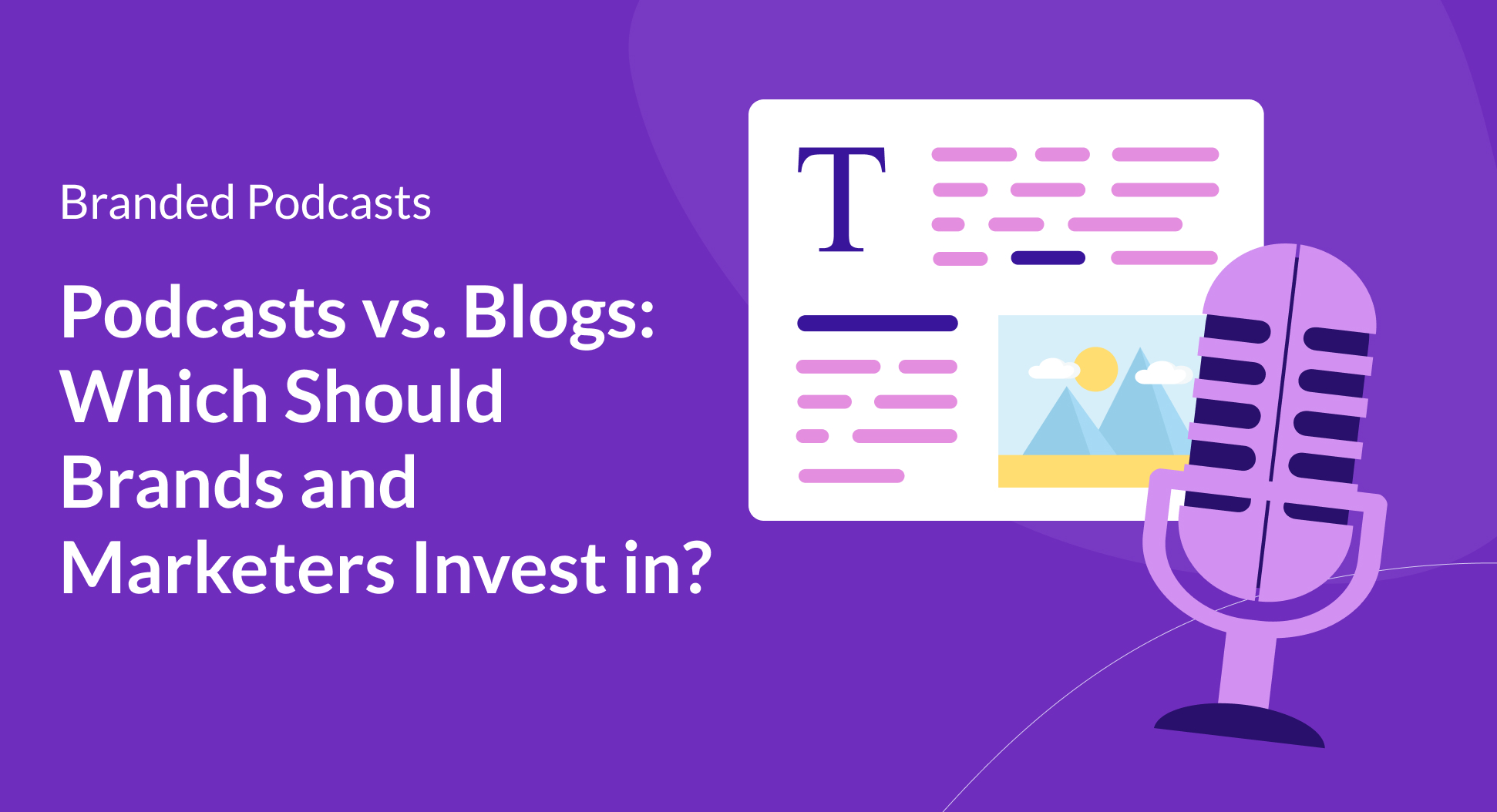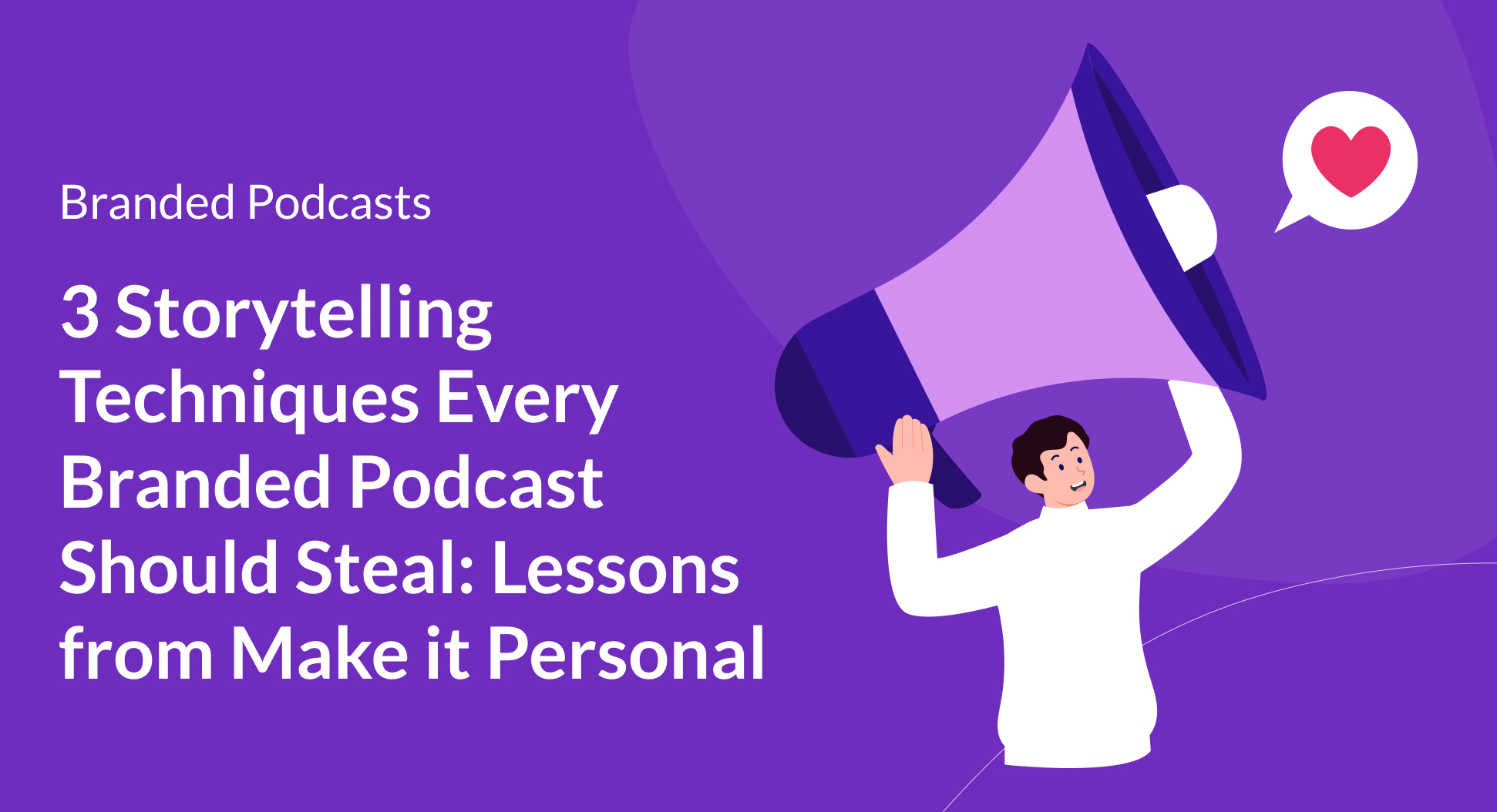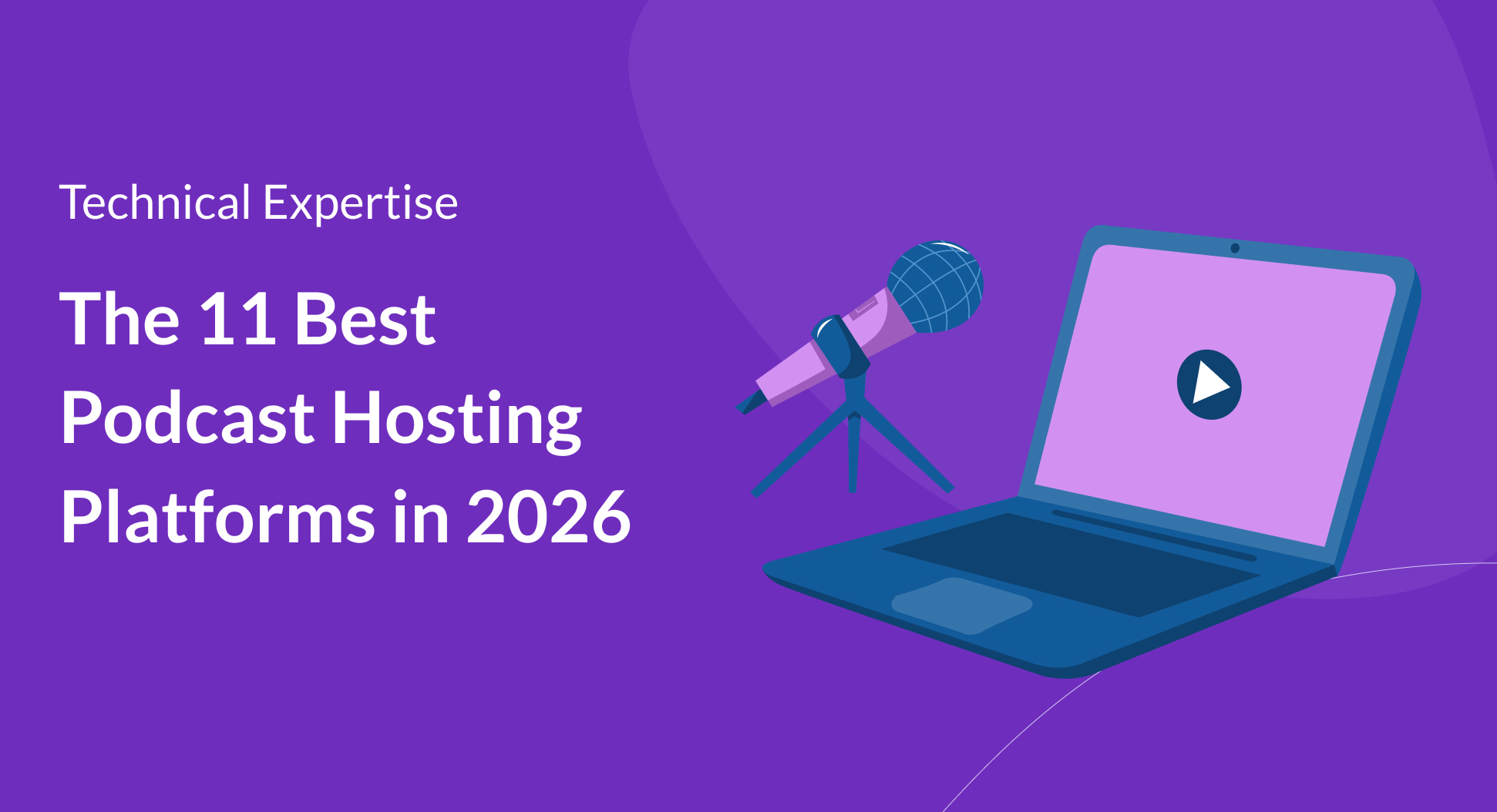Contents
Does your company already have a branded podcast? Or are you thinking of launching one?
No matter where you are in your podcast journey, there are monetization strategies that your brand can explore depending on your goals, audience size, resources (time, people, budget), and more.
Regardless of which path you choose, it’s important to think about the different ways you can generate revenue from your show.
Before we dive in, here are two quick things to keep in mind throughout your monetization journey:
Your podcast is the product
Instead of focusing uniquely on content meant to convert, modern marketers are creating compelling content that doesn't just sell but creates a loyal community.
Even if generating revenue is your primary goal for your podcast, remember that people are perceptive. They can sense when they're being pitched to – even in the disguise of a podcast.
On top of that, no one consumes irrelevant or pointless content. To frame your content (in this case, podcast) like a product you need to put out content that’s actionable, informative, and entertaining.
This outlook will transform the way you strategize, create, and (of course) monetize your content.
Quill Tip: To learn more about why you should be treating content like a product and how to do it, check out our full post.
Your podcast has its own unique brand
Treating your podcast as its own brand is more than just creating a visual identity or a catchy tagline—it's about creating a distinct personality that resonates with your audience, thereby building loyalty and recognition.
In the context of monetization, a robust brand identity opens doors for brand extensions, such as merchandise, exclusive content deals, or in-person or online events.
Quill Tip: Interested in learning more about building a podcast brand and how to differentiate it from your company? Here’s our top 5 tips.
Now that you’ve nailed down the mindset to monetization, let’s dive into some of the best ways to monetize your branded podcast in 2025:
1. Events and exclusive experiences
Whether it’s a live event or an exclusive experience, like a masterclass, workshop, or unique networking opportunity, it is a great way to generate revenue.
By hosting in-person or virtual events, you can create a sense of community among your listeners and offer unique opportunities for ticket sales, sponsorships, and merchandise sales. This not only generates revenue but also helps strengthen the connection between your brand and your audience.
Think of Call Her Daddy. After securing the top spot as the most listened-to female podcast, host Alex Cooper started her own network, Unwell. The network signed top influencers Alix Earle and Madeline Argy and sold out stadiums and merch tents across North America.
There are a few things to think about before you activate events for your branded podcast.
- Figure out who your target audience is: Once you know who you are speaking to, what they value, and what they care about – it’s easier to create the kind of event they would be interested in attending.
- Create unique, one-of-a-kind events: Develop events that tie into the theme or topic of your branded podcast. For example, if your podcast is about small businesses, you can host an event featuring panel discussions with successful entrepreneurs so the audience can learn tangible tips. Or if your podcast focuses on health and wellness, host a yoga or wellness retreat centered around healthy farm-to-table meals.
- Sell tickets to your event: Your audience will happily pay for tickets if they know that it will attract like-minded people (people love to network and grow their community) and they’ll receive some sort of value in exchange. Be sure to offer early bird discounts or VIP packages to incentivize people to buy tickets.
- Find the right sponsors: Companies are always looking to sponsor podcasts that help build their credibility and thought leadership in a specific space. Find organizations that have the same values and ethos as your podcast. Sponsors can provide financial support and offer products, services, or discount codes for those attending your events.
- Leverage audience data: Be sure to capture data from attendees such as names, phone numbers, email addresses, social media handles, and other relevant information. These details help build your database that can be leveraged for future events and meetups.
- Promote your events: Social media is your best friend. Be sure to use social channels, email marketing, or paid advertising to create buzz and attract a wider audience.
- Sell merch: Create merch that’s specific to your show in the form of clothing, water bottles, notebooks, etc. Merch is not only an additional revenue stream but it helps to solidify the community around your show.
2. Advertising and sponsorships
If you have a specific target audience and unique profile, it should be easy to secure an advertising deal.
When you sell a sponsorship or ad, you’re essentially selling airtime before (pre-roll), during (mid-roll), or after your episode (post-roll). The best ad placement, and thus the most expensive, is generally mid-roll because your listeners are less likely to skip through.
If you’re wondering about the effectiveness of advertising through a podcast in 2023, here are some stats that might sway your decision:
- According to Ad Results Media, a whopping 68% of consumers said they were more willing to consider purchasing a product or service after hearing about it on a podcast, compared to YouTube/Online Video (62%), Social Media (61%), Live or Recorded TV ( 54%), and Am/FM Radio (49%)
- Ad Results Media also recently reported that podcast listenership has risen recently, with 120 million monthly listeners
- What’s more, more than half of these podcast listeners consume nine podcast episodes a week
Typically, there are two types of podcast ads:
- Host-read ads: You, the host, share and talk about the product or service in question. This option can be less intrusive or disruptive to the flow of your episode.
- Pre-recorded ads: The brand or company that buys the ad slot provides you with a pre-recorded advert. All you have to do is include the recording in the agreed number of episodes. This route is often also used with dynamic ad insertion tools.
In terms of fees, you can charge a fee for every ad placement. The amount can vary depending on the length of the ad, size of your audience, how niche your audience is, etc.
In a similar vein to advertising, you can approach companies that are a good fit for your podcast and offer them a sponsorship deal. They pay to have their brand mentioned and advertised during your podcast episodes.
Quill Tip: If you’re interested in learning more about podcast advertising and why it’s so effective, check out our top 4 reasons why we suggest it becomes your next paid strategy.
3. Gated content or paid memberships
If you have an engaged fan base, creating paid membership tiers is a surefire way to make money from your podcast. This is a great option for monetization since listeners feel they’re getting exclusive and intimate access to special content, so it’s of mutual benefit.
Plus, for brands that aren’t looking to monetize through other brands' advertising on their show, a membership structure is an effective way to still earn money from your content.
Or alternatively, if you’ve already got that lucrative ad deal under your belt, you could offer an ad-free option to your paying members. There are many different ways to go about generating revenue through gated content and paid memberships!
If you want to go the exclusive, gated content direction there are a few things to consider:
- Create additional content: Create content that expands on or complements your show. This could be in the form of whitepapers, infographics, e-books or bonus video content like behind-the-scenes or bloopers.
- Set up membership or a subscription model: This set up allows listeners to access the additional content in exchange for a fee. Offer different tiers of membership with varying levels of access to the gated community. There are different tools that do this for you such as Uscreen, Patreon or Buy Me a Coffee.
- Promote your gated content: Talk about it on your podcast, tease it on social media, and send out newsletters about it. Encourage your fanbase to sign up for a membership or even a trial period so they are more willing to take the leap.
- Offer discounts: Your true fans want to be early adopters so make the deal sweeter for them! Encourage them to sign up for a membership or subscription.
- Provide value, value, and more value: Make sure you’re continuously providing value in the form of content to your subscribers to keep them engaged and happy. People want to know their dollars were well spent!
Quill Tip: You can always check out CoHost’s B2B Analytics Tool for generating valuable leads – it’s a great way to identify the companies that are tuning in and engaging with your podcast.
5. Affiliate marketing
Affiliate marketing is a performance-based form of marketing where businesses recommend products or services to their audience and earn a commission for every sale that is made through the unique affiliate link.
The best part is, since there’s less financial risk for businesses that provide affiliate links, they’re a perfect monetization method for up-and-coming content creators or brands who have just launched a podcast.
6. Merch and product sales
Everybody loves a bit of branded merch. If you’ve got a recognizable logo or podcast artwork, you can instantly produce everything from hoodies to water bottles.
The best thing about branded podcast merch is that it works twice.
- First off, the sale of the physical product is an additional income stream
- Second, it’s an extremely effective way to market your podcast for free! Every time one of your listeners wears their branded t-shirt, they’re passively promoting your podcast (win-win!)
There are some great examples of podcast merchandise, including Alex Cooper’s “Call Her Daddy” merch that includes hoodies and baseball caps.
Remember, you can also branch away from physical products to include services such as books, e-books, an online course, or a coaching program.
How to generate revenue from your branded podcast
Generating revenue from your branded podcast requires a combination of creative strategies and a deep understanding of your target audience.
By exploring various monetization methods such as:
- Events and exclusive experiences
- Advertising and sponsorships
- Gated content or paid memberships
- Affiliate marketing
- Merch and product sales
You can create a sustainable income stream while continuing to provide engaging and valuable content for your listeners.
If you’re interested in learning more about podcast monetization and how a full-service podcast agency can help you along the way, reach out to the Quill team.






.png)

.png)

.png)




.png)
.png)
.png)
.png)